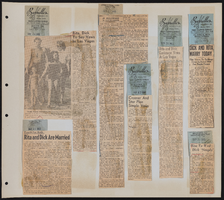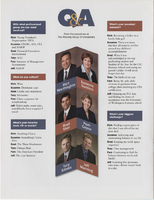Search the Special Collections and Archives Portal
Search Results
Henry Kronberg Papers
Identifier
Abstract
The Henry Kronberg Papers is comprised of photographs, newspaper clippings, and business records from 1945 to 2017 that document Henry Kronberg's business, Stoney's Pawn Shop, his personal life, and his involvement with the Jewish community in Las Vegas, Nevada. The collection also includes
Archival Collection
D. D. Cotton oral history interview
Identifier
Abstract
Oral history interview with D. D. (Ethel Dolores) Cotton conducted by Claytee White on February 14, 1997 and March 21, 1997 for the Women's Research Institute of Nevada (WRIN) Las Vegas Women Oral History Project. In this interview, Cotton discusses the beginnings of her dance career in New York City, New York. Later in the interview, Cotton discusses working in Las Vegas, Nevada at the Cotton Club and her interactions with other African American entertainers. Cotton also discusses race relations and her experiences as an African American dancer in Las Vegas. Cotton later goes on to discuss her career change in the service industry.
Archival Collection
Margo Mansergh Papers
Identifier
Abstract
The Margo Mansergh Papers (approximately 1920-2010) document the life of former showgirl and dancer Margaret "Margo" Mansergh Tomaszewski. Materials include photographs of Margo modeling, backstage at various shows, portraits, and personal family photographs as well as programs from her international career performing in the Lido de Paris and Pigalle Nightclub in London, as well as a number of shows in Las Vegas, Nevada, such as Vive Les Girls, Casino de Paris, Minsky's Burlesque, and Lido de Paris at the Stardust. The collection contains materials from Mansergh's modeling career, including photographs, book covers, and images of her as an extra in films. Digital images from the closing Stardust performance and an event for Miss Bluebell are also found in the collection.
Archival Collection
Richard W. Bunker oral history interviews
Identifier
Abstract
Oral history interviews with Richard W. Bunker conducted by Stefani Evans and Claytee D. White on July 18 2017, July 21, 2017, and September 28, 2017 for the Building Las Vegas Oral History Project. In this interview, Bunker discusses the history behind a wide range of events that affected the daily lives of Southern Nevadans. He talks about his role in a consolidation attempt between the Clark County and Las Vegas, Nevada governmental structures that was halted by the courts in 1975. Bunker then recalls working as a member and Chair of the Nevada Gaming Control Board and his work with various casinos and hotels including Circus Circus, the Dunes, and the Aladdin. He discusses replacing key people at the Gaming Control Board, and the Federal Bureau of Investigation’s (FBI) Operation Yobo sting. He then speaks fondly of his longtime friends Jim Gibson, Judge Lloyd George, and Jim Joyce. Lastly, Bunker discusses water rights, supply, and management issues in Nevada as it relates to the Nevada Resort Association, Las Vegas Valley Water District, Southern Nevada Water Authority, and the Colorado River Commission.
Archival Collection
Irene Porter oral history interviews
Identifier
Abstract
Oral history interviews with Irene Porter conducted by Angela Moor on November 06, 2009, November 20, 2009, and January 29, 2010 for the Women's Research Institute of Nevada (WRIN) Las Vegas Women Oral History Project. Porter begins her interview discussing her childhood in North Dakota in the 1940s including her experiences growing up on military bases and her father's military career. Porter then discusses moving to Las Vegas, Nevada in 1959 and her experiences at Rancho High School. Porter describes her classes, social activities, and community. Porter then talks about her career and experiences at the Clark County Planning Department including the activities the Department was responsible for, learning to write grants, the glass ceiling, and how she eventually became Director. Porter goes on to discuss working for the City of North Las Vegas and lobbying for the state of Nevada.
Archival Collection

Jolie Brislin oral history interview: transcript
Date
Archival Collection
Description
Oral history interview with Jolie Brislin conducted by Barbara Tabach on April 21, 2017 for the Southern Nevada Jewish Heritage Project. In this interview, Brislin discusses her family background and upbringing in Redwood City, California. She remembers moving to Las Vegas, Nevada in 1991, her involvement in the Jewish community, and going on a trip to Israel. Brislin talks about joining the Anti-Defamation League, becoming the Regional Director of the organization in 2015, and her mentors at the time. Lastly, Brislin discusses the rise of hate acts towards minority groups across the country, and the issue of cyber-bullying.
Text

Dr. Deborah Kuhls oral history interview: transcript
Date
Archival Collection
Description
Oral history interview with Dr. Deborah Kuhls conducted by Barbara Tabach on December 29, 2017 for the Remembering 1 October Oral History Project. In this interview, doctor Deborah A. Kuhls describes the preparation and procedures implemented at the University Medical Center of Southern Nevada (UMC) during the night of the October 1, 2017 mass shooting in Las Vegas, Nevada. She describes her experiences from that night and into the next morning, starting from when the trauma center first learned about the shooting to when patients began arriving. She goes into detail on the hospital's Military-Civilian Trauma System Partnership, which allowed for the installation of a second trauma area to treat the large volume of patients. In addition to the events at the hospital, Kuhls talks about the flurry of activities during the week of the shooting, including interviews with various media, the statewide meeting for surgeons, fellows, and residents where "stop the bleed" training was provided, and general meetings with various government officials, including Donald Trump. Deborah Kuhls also discusses the emotional impact of the shooting and its aftermath as well as her goals for the future of trauma in the medical field.
Text



